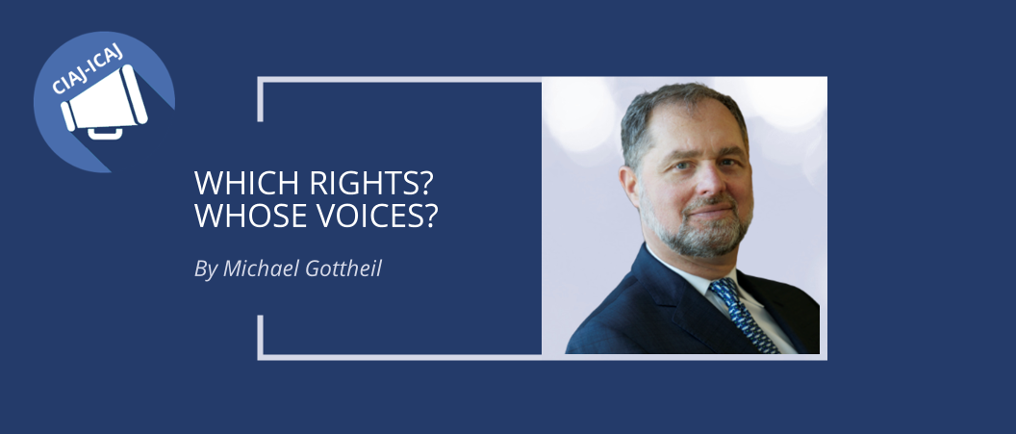Which Rights? Whose Voices?

“Diversity is not a mere characteristic of life … diversity is a condition necessary for life.”
—Barry Lopez, Horizon
It’s been a tough year. Many challenges and things falling apart. However, there also seems to be a certain common feeling: a desire to look forward, to be hopeful, even positive. It has to do with the idea of rebuilding, recovering, getting back to not just normal, but a new normal.
Certainly, this common feeling stems from the global pandemic with its health, economic, and social impacts. We all want to move on from the immediate effects of the pandemic, but we also see the idea of recovery and rebuilding as an opportunity to do more, to meaningfully address many of the other problems that we’ve been facing. For example, Indigenous and anti-Black racism, the continued existence of gender-based violence, homelessness, unemployment and underemployment, corporate globalization, environmental crisis, and extreme inequality are all challenges that have confronted us for some time, but have been highlighted by our current crisis. Even for those who may not directly experience the suffering and hardship of these broader problems at this time, there is now a wide acceptance that there are systemic roots to our current dilemmas, and this moment in history offers an opportunity to find solutions that do more than scramble to put Humpty Dumpty back together again.
But how might we begin doing this? How might we look for ways that take us to a different and better place, rather than cement us into systems that seem to have landed us in our current predicament? There will be many views to be considered and many voices to be heard, but it would seem we would want to reflect on fundamental values and draw on the diverse voices that are the strength of our community.
Let’s start with human rights. Most Albertans support, and are proud to support, human rights. For example, take the following passages from the Preamble to the Alberta Human Rights Act:
WHEREAS multiculturalism describes the diverse racial and cultural composition of Alberta society and its importance is recognized in Alberta as a fundamental principle and a matter of public policy;
WHEREAS it is recognized in Alberta as a fundamental principle and as a matter of public policy that all Albertans should share in an awareness and appreciation of the diverse racial and cultural composition of society and that the richness of life in Alberta is enhanced by sharing that diversity;
These are grand and important words. They remind us that our diverse and multicultural heritage is something we ought to be proud of and to celebrate. However, if diversity is not just a magical condition of life (as the writer Barry Lopez says), but a condition necessary for life, we need to ask, particularly at this difficult juncture, what are we doing with our diversity? Are we truly inviting diverse voices into the difficult discussions about how to recover and rebuild? Are we willing to consider diversity, not just the colourful and flavourful idea of diversity (like the one we celebrate on Heritage Day), but also the values and voices that might make us feel uncomfortable because they provide parts of a solution that are unfamiliar? Worse still, might we shut out diverse ideas because they may threaten benefits to which some of us have become accustomed and are unwilling to risk?
If we are truly to value our diversity and see it as a strength at a time when we need as much wisdom as we can find, we must be willing to embrace others and not simply be tolerant. Tolerance and sympathy are not the same as empathy and respecting each other as equals. We must find ways and commit to bringing diverse voices and ideas to the decision-making tables.
The other thing we might want to reflect upon on this Human Rights Day is to remember the full panoply of rights that are enshrined in the Universal Declaration of Human Rights. There are 30 rights enumerated in that document. They are said to be inalienable and fundamental. They are rights to which all human beings are entitled, and to which all States have agreed to protect, to promote, and to ensure for their citizens. They include freedom of speech, freedom of religion, and freedom from discrimination based on gender, race, and ethnicity. They prohibit slavery and ensure free elections. They also declare that all are entitled to housing, and to work and receive fair compensation for their work. They enshrine a right to a public education and to social security.
The question is: are we truly prepared to reaffirm our commitments to these “inalienable” and fundamental rights? Are we willing to measure our systems, policies, laws, and programs against these commitments? Are our leaders prepared to be accountable for achieving these values, and are we prepared to hold them truly accountable? Most importantly, are we prepared to measure who we are as a people and as a community, in all our magnificent diversity, against the principle that we all have a responsibility to one another to ensure these rights for all?
As we undertake the task of recovery and rebuilding, perhaps human rights and diversity can provide guidance. However, we will need to muster both the confidence and the humility to listen and acknowledge that we have come to a place where we need the wisdom of the many if we are to truly build back better. We are told we live at a time where the citizenry is polarized, yet we are also at a time when as a society, from businesses to governments and from municipalities to community organizations, there is momentum behind the idea that our diversity is our strength. On this Human Rights Day and every day, let us not waste that strength because of fear, prejudice, or shortsighted self-interest.
“We will need the entire sum of human knowledge as it is encoded in all the world’s languages to truly understand and care for the planet we live on. The loss of any human language means that, in the most difficult straits humanity has ever found itself in, one more strategy for survival has been thrown away.”
—K. David Harrison,
The Last Speakers: The Quest to Save the World’s Most Endangered Languages

